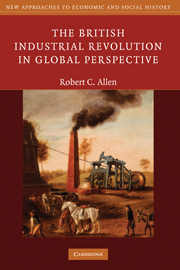Book contents
- Frontmatter
- Contents
- List of plates
- List of figures
- List of tables
- Acknowledgments
- 1 The Industrial Revolution and the pre-industrial economy
- Part I The pre-industrial economy
- Part II The Industrial Revolution
- 6 Why was the Industrial Revolution British?
- 7 The steam engine
- 8 Cotton
- 9 Coke smelting
- 10 Inventors, Enlightenment and human capital
- 11 From Industrial Revolution to modern economic growth
- References
- Index
7 - The steam engine
Published online by Cambridge University Press: 05 June 2014
- Frontmatter
- Contents
- List of plates
- List of figures
- List of tables
- Acknowledgments
- 1 The Industrial Revolution and the pre-industrial economy
- Part I The pre-industrial economy
- Part II The Industrial Revolution
- 6 Why was the Industrial Revolution British?
- 7 The steam engine
- 8 Cotton
- 9 Coke smelting
- 10 Inventors, Enlightenment and human capital
- 11 From Industrial Revolution to modern economic growth
- References
- Index
Summary
The high state of wealth and civilisation which the English people have attained within the last half century, has been greatly promoted by the application of the power of the steam-engine to various purposes of the useful arts, in aid of manual labour.
John Farey, A Treatise on the Steam Engine, 1827For most of human history, muscles (human and animal) were the main sources of power. In the ancient world, wind and water were also harnessed to the task. The steam engine was the next great step forward. Its impact on economic output in the eighteenth century was modest (von Tunzelmann 1978), but the use of steam to power industry increased dramatically in the nineteenth, and it was applied to transportation where the railway and steamship created a tightly integrated world economy. Between 1850 and 1870, steam technology accounted for two-fifths of the growth in British labour productivity (Crafts 2004, p. 348). By freeing the economy from dependence on wind, water and muscle, the energy that each worker could deploy increased dramatically and with it the productivity of labour.
The history of the steam engine goes through the two phases described in the last chapter. The first phase was the macro-invention by Thomas Newcomen. His atmospheric or fire engine, as it was called in the eighteenth century, was a biased technical change in which the demand for fuel increased dramatically.
- Type
- Chapter
- Information
- The British Industrial Revolution in Global Perspective , pp. 156 - 181Publisher: Cambridge University PressPrint publication year: 2009

